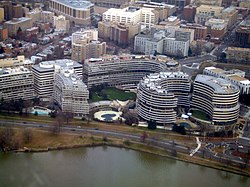New York Times Co. v. United States: Difference between revisions
Content deleted Content added
No edit summary |
No edit summary |
||
| Line 3: | Line 3: | ||
In the midst of the [[Watergate scandal]], the ''Times'' case featured a [[constitutional crisis]] in which the U.S. [[President]] [[Richard Nixon]] had claimed [[executive]] authority to force the prominent newspaper to suspend publication of [[classified information]] in its possession. The question before the court was if the constitutional [[freedom of the press]] under the [[First Amendment]] was subordinate to a claimed Executive need to maintain the secrecy of information. |
In the midst of the [[Watergate scandal]], the ''Times'' case featured a [[constitutional crisis]] in which the U.S. [[President]] [[Richard Nixon]] had claimed [[executive]] authority to force the prominent newspaper to suspend publication of [[classified information]] in its possession. The question before the court was if the constitutional [[freedom of the press]] under the [[First Amendment]] was subordinate to a claimed Executive need to maintain the secrecy of information. |
||
==Research Resources== |
|||
* [http://www.firstamendmentcenter.org/faclibrary/case.aspx?case=NY_Times_v_US First Amendment Library entry for ''New York Times Co. v. United States''] |
|||
==External links== |
==External links== |
||
Revision as of 01:24, 25 September 2005
| Watergate scandal |
|---|
 |
| Events |
| People |
New York Times Co. v. United States, 403 U.S. 713 (1971) was a United States Supreme Court decision. The ruling made it possible for the New York Times and Washington Post newspapers to publish the then-classified Pentagon Papers without risk of government censure.
In the midst of the Watergate scandal, the Times case featured a constitutional crisis in which the U.S. President Richard Nixon had claimed executive authority to force the prominent newspaper to suspend publication of classified information in its possession. The question before the court was if the constitutional freedom of the press under the First Amendment was subordinate to a claimed Executive need to maintain the secrecy of information.
Research Resources
External links
- Text of the decision, 403 US 713
